By M. Sharpe
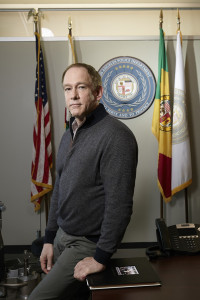 When we last spoke to James Duff at the beginning of season five, he alluded to how the theme of this season of Major Crimes, balance, would have repercussions for everyone in the team. As the summer season wraps up tonight with part three of the summer finale, we caught up with Executive Producer James Duff to shed some light on some of the biggest changes we’ve seen so far this season (RIP Chief Taylor), and what we can expect both in tonight’s finale, and for the winter season of Major Crimes, and beyond.
When we last spoke to James Duff at the beginning of season five, he alluded to how the theme of this season of Major Crimes, balance, would have repercussions for everyone in the team. As the summer season wraps up tonight with part three of the summer finale, we caught up with Executive Producer James Duff to shed some light on some of the biggest changes we’ve seen so far this season (RIP Chief Taylor), and what we can expect both in tonight’s finale, and for the winter season of Major Crimes, and beyond.
MCTV: I would be remiss to start this off without asking about Taylor, and the shocking decision to kill him off in part one of this three-part summer finale. What lead you to making the decision to have Taylor’s death be such a catalyst in this arc, and as part of the season as a whole?
James Duff: There’s two things to discuss with this. Part one of that is, opening Taylor’s office was always my plan, so that was always going to happen at some point. Part two is that balance is the theme of all thirteen summer episodes – it links them all together. I couldn’t do a study on balance without including the balance of power, and without completely removing the balance of power and forcing a new center of gravity into the circumstances around which Major Crimes revolves. And this new center of gravity that the team is now looking to f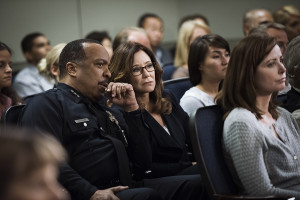 ind is going to be the subject of the next eight episodes–how we adjust to changes, who becomes the center, and how everyone must adjust to accommodate that new center.
ind is going to be the subject of the next eight episodes–how we adjust to changes, who becomes the center, and how everyone must adjust to accommodate that new center.
History itself is the story of a succession of one center of gravity replacing another, and how people must adapt constantly to that sort of change. People either adjust, or they crash and burn. That’s just how it works. And so, Major Crimes is adjusting. And that will be the back eight episodes we’ll see this winter. That’s always what I meant to happen. And beyond that, there is a world beyond the adjustment of gravity, and so that would be our next season, if we end up getting one.
It’s also important to remember that the LAPD is a dangerous place to work, and police officers have an extremely dangerous job in this day and age. The Los Angeles Police Department trains hard to do the right thing, and to bring policing into the twenty-first century, but it’s still every bit as vulnerable as the bad police departments are. There’s no discrimination, apparently, between good police officers and bad police officers. Taylor also encompassed the essence of the blue/black divide, because he’s both. And both sides are damaged by this divide. And I’m not taking sides, I’m just dramatizing the divide that exists, and he was a very good way to dramatize that nobody wins when violence is the answer.
So Taylor’s death accommodated the two things I needed. One was to explore the balance of power and how it affects our daily lives, which is what part two of the finale was about. But, any meditation on the balance of power in our human life would require us to take into account religion, and its force in the world and on our leading characters. So both of these major events, Taylor’s death, the shooting of Dwight Darnell, the balancing of what we owe to our spiritual selves and what we owe to our professional selves, all of that was meant to create special circumstances for Sharon Raydor. And I think we did that.
MCTV: Speaking to that examination of religion, last week was a departure for the show, in that it both took on a different structure in how it was framed from Sharon’s confession, but also gave us a much closer look at Sharon than we’ve seen for a while. There has been hints that Sharon has this strong religious part to her, but this was the most overtly we’ve seen it, and also gave a bit more insight into the state of her relationship with Andy, and what she feels like she can and can’t talk to him about.
JD: To be clear, it’s not that she can’t rely on Andy to talk to, it’s just as she says, she can’t rely on Andy to talk to about the death of Dwight Darnell. And truly, she couldn’t rely on a lot of the audience, either. A lot of the audience would tell her, ‘Look, you did the right thing. Get over it.” I heard that from people after the episode aired. 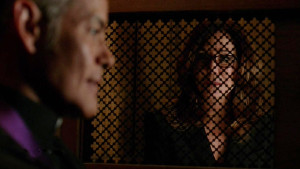
But taking a human life is complicated, no matter the circumstances. For example, with the military, we have 20 veterans a day committing suicide, and a lot of it has to do with loss of life they are involved in. We train people to believe that murder is wrong, and then we send them out to kill people, and don’t understand why they’re confused afterwards. And so I thought it would be important to show Sharon in a moral quandary – wanting to feel grief for having stopped Dwight Darnell from killing anybody else through violence, which she’s always been hesitant to use, unless absolutely necessary. And she’s never killed anyone, and I wanted to explore that aspect of her personality.
Also, she’s very Catholic. That has been mentioned throughout the series. She was so Catholic she didn’t divorce her husband for over thirty years. She loves angels, that’s an established fact, and she sent Rusty to a Catholic school. She’s been very serious about her religion, although, this is a murder show, not “True Confessions” or anything like that, so we just haven’t seen it more than that. But if she and Andy were to perhaps want to do something more than just live together, that would create conflict for her. And so maybe there’s a reminder there, maybe I’m setting something up for the future, by reminding everybody about how Catholic she is.
MCTV: Going back to Taylor for a moment, we’re heard through some casting announcements that we’re going to see the power shift, and we’re going to see some new people come in to be in the running for his job. Are we going to get closure on the loss of Taylor at all, and the impact that death itself has on the team?
JD: Well, we will be talking about Taylor for ages to come. And there is an attempt to honor him in the summer finale in the first act. Not at a funeral, because we’ve already done that, when we went to the funeral of the Chief of Police. I don’t want to give away too much, but he will not be gone completely. He’s a member of the Major Crimes family and he’ll be treated that way throughout.
MCTV: In terms of the power vacuum, the Sharon of a few years ago had a lot of desire to move up the ranks. But now that we’re seeing this job having opened up, it’s hard to envision Sharon wanting to leave Major Crimes now that she’s established this great team, and everyone works together so well. How is this power vacuum going to affect her, in a desire to move up the ranks, or lack thereof? 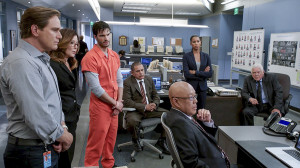
JD: It’s a delicate dance inside the LAPD when one of these positions opens up. If you get considered for a promotion, you have to try to get it because if you fail, you’ll lose what you have. And that happens all the time. It’s an unfortunate circumstance, but when new people move in to positions of power, then the people underneath them, who were also trying to get that position of power, end up with a lot of ‘freeway therapy’. They get transferred to Harbor Division or they end up at SOB (Special Operations Bureau) or teaching at the Police Academy. So in terms of a career path, it’s dangerous.
On the other hand, you don’t get to decide this. The Police Chief job is decided by the Mayor in concert with the city council and the police commission. The job of Assistant Chief is decided entirely by the Chief. There’s no one else to ask. So if he interviews you, and everybody knows you’re up for the job, then you’re exposed. That’s why we’re bringing on Camryn Manheim, and another actor I can’t announce yet, to all be in play for the job. But the struggle to replace Taylor, will also be a struggle to protect Major Crimes. Because a new Assistant Chief comes in, and the division changes. So Sharon is given a lot to think about in these back eight episodes this winter, and that influences how she has to react to being considered for the position. 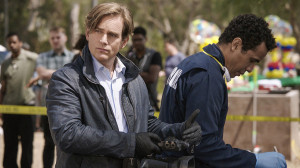
MCTV: Switching just quickly over to Buzz, and his journey this season. We saw last episode that he’s really stepped up in this investigation and come into his own. Are we going to see more of that now that he has had a taste of being part of this side of the police work?
JD: Well, you’re going to see his realization that things are not over. That’s going to come back. So the conclusion of Buzz’s story is both final, and ambiguous. And Phillip has done an amazing job this season, and in the last scene of the case, he does an amazing job, and in the scene after the case, he does an amazing job. And also stepping up and showing he’s capable has been Julio Sanchez, as a foster parent. And we’re going to see just how much this new experience has meant to him in the finale.
MCTV: Finally, you mentioned that a potential season 6 would have a focus around the adjustment to whoever becomes the new chief, and how that appointment could change Major Crimes. There hasn’t been an announcement yet for season 6 from TNT. Any updates there?
JD: It’s impossible to know what the network consider their needs to be right now, and I can’t say for sure anything. They have not indicated a pickup for next season to me yet, so I really don’t know. I’m very happy overall with how we’ve managed our numbers this season, especially given the switch to 10pm. We did much better than we thought we would do and I think better than TNT thought we would do. It’s a bit of a win-win for us and hopefully the network will want to solidify their gains here and do it again.
The summer finale of Major Crimes airs tonight at 10pm/9c on TNT.
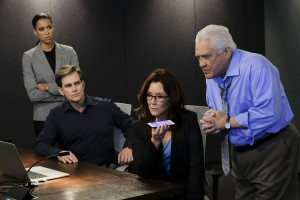 As Major Crimes prepared to film the two-part finale to season 5, there was some question whether what they were filming would be a season or series finale. Several versions of the script were prepped by the writers, and just days before filming on the “Shockwave” arc began, TNT renewed the show for season six, and tonight the season finale of Major Crimes airs at 9pm/8c.
As Major Crimes prepared to film the two-part finale to season 5, there was some question whether what they were filming would be a season or series finale. Several versions of the script were prepped by the writers, and just days before filming on the “Shockwave” arc began, TNT renewed the show for season six, and tonight the season finale of Major Crimes airs at 9pm/8c. 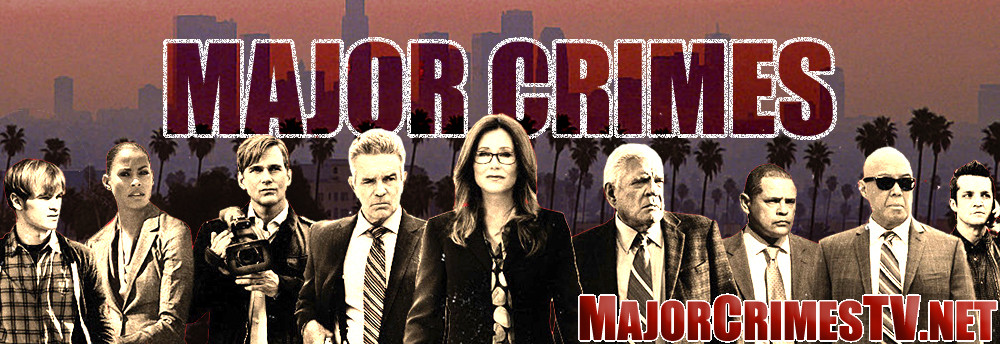





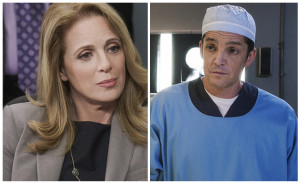
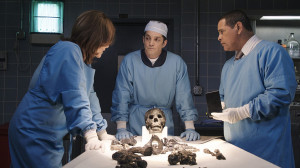 JDA: We all have had our share of anxiety about the change, because we were in the same time slot for so long. But, we have such great leadership in James Duff and Mike Robin, and we were all encouraged by them early on to say, “You know what? Let’s just hit it out of the ballpark and have the best year ever, and just focus 100% on creating an amazing work.” A “if you build it they will come” mentality. And it’s so great to actually see that happen, and it’s so rare, because television is not being viewed as much as other mediums these days, so it’s great to know that we were able to meet the challenge, and we were able to bond together to get through it, and here we are! It’s been fantastic. We’re very lucky.
JDA: We all have had our share of anxiety about the change, because we were in the same time slot for so long. But, we have such great leadership in James Duff and Mike Robin, and we were all encouraged by them early on to say, “You know what? Let’s just hit it out of the ballpark and have the best year ever, and just focus 100% on creating an amazing work.” A “if you build it they will come” mentality. And it’s so great to actually see that happen, and it’s so rare, because television is not being viewed as much as other mediums these days, so it’s great to know that we were able to meet the challenge, and we were able to bond together to get through it, and here we are! It’s been fantastic. We’re very lucky.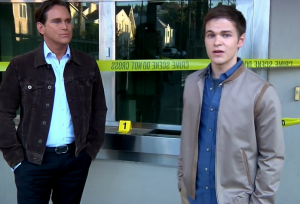 has seen Buzz and Rusty team up to reopen the unsolved murder of Buzz’s father. Through both storylines in episodes, as well as Rusty’s
has seen Buzz and Rusty team up to reopen the unsolved murder of Buzz’s father. Through both storylines in episodes, as well as Rusty’s 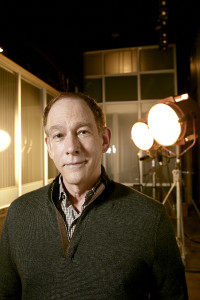
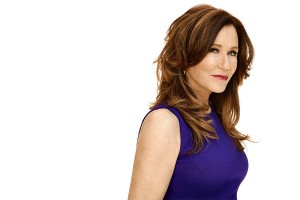 Four seasons into TNT’s hit series Major Crimes, viewers have developed a personal connection to the LAPD’s fiercely loyal Captain in the same way that her detectives have developed a devotion to her. For Raydor, family extends beyond the people with whom she shares bloodlines or family names. For Mary McDonnell, the chance to portray a woman of equal emotional and intellectual strength and integrity is a source of joy for her as an actress.
Four seasons into TNT’s hit series Major Crimes, viewers have developed a personal connection to the LAPD’s fiercely loyal Captain in the same way that her detectives have developed a devotion to her. For Raydor, family extends beyond the people with whom she shares bloodlines or family names. For Mary McDonnell, the chance to portray a woman of equal emotional and intellectual strength and integrity is a source of joy for her as an actress.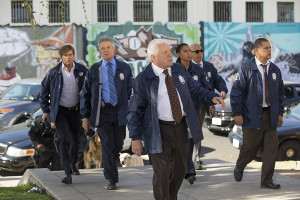
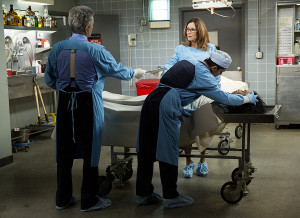 one case over five episodes instead of the traditional murder-of-the-week structure is a first for Duff, and in many respects, a first in general for televised programs. Duff admits that the choice is both unconventional but exciting, “It’s very different. It’s interesting to see the show continue its evolution and finding interesting things for our fantastic series regulars to do. We are very excited by the challenge.” It’s a bold move for a highly successful show with a devoted fan base to suddenly flip the switch part-way through a season, but Duff is confident that fans, whom he’s always shared a close connection with, will appreciate the creative liberty which he has taken. He notes that if it doesn’t sit well with them, “our audience will not be shy in telling me if I’m mistaken.”
one case over five episodes instead of the traditional murder-of-the-week structure is a first for Duff, and in many respects, a first in general for televised programs. Duff admits that the choice is both unconventional but exciting, “It’s very different. It’s interesting to see the show continue its evolution and finding interesting things for our fantastic series regulars to do. We are very excited by the challenge.” It’s a bold move for a highly successful show with a devoted fan base to suddenly flip the switch part-way through a season, but Duff is confident that fans, whom he’s always shared a close connection with, will appreciate the creative liberty which he has taken. He notes that if it doesn’t sit well with them, “our audience will not be shy in telling me if I’m mistaken.”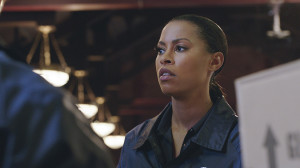 As Duff explains, much of the reasoning behind bringing Sykes to the center of the action in the winter arc has to do with the character of Sykes herself, and points out that as the newest member of the team, she was the most likely candidate to be willing to explore the mystery surrounding the new case in a way that would be unthinkable to anyone else on the squad. Duff also says he relished the chance to finally give Sykes her own fully realized storyline. “We’ve never been able to fully utilize Sykes in our previous seasons and the structure of these episodes finally allows us to do just that. Unlike most of the cast, she wasn’t part of the original The Closer crew so it’s been a slower ride up for her and I’m just thrilled to be able to show everybody what Kearran Giovanni can do. She’s got game, and Amy Sykes has game, and I think the audience has really grown to like Sykes and that they’ll really enjoy getting to see her in action.”
As Duff explains, much of the reasoning behind bringing Sykes to the center of the action in the winter arc has to do with the character of Sykes herself, and points out that as the newest member of the team, she was the most likely candidate to be willing to explore the mystery surrounding the new case in a way that would be unthinkable to anyone else on the squad. Duff also says he relished the chance to finally give Sykes her own fully realized storyline. “We’ve never been able to fully utilize Sykes in our previous seasons and the structure of these episodes finally allows us to do just that. Unlike most of the cast, she wasn’t part of the original The Closer crew so it’s been a slower ride up for her and I’m just thrilled to be able to show everybody what Kearran Giovanni can do. She’s got game, and Amy Sykes has game, and I think the audience has really grown to like Sykes and that they’ll really enjoy getting to see her in action.”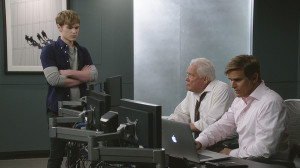 along with the structure of the sustained arc, work together to also function as another storytelling device, and a new prism through which to view the characters. “It just gave us a lot of opportunity not to just tell a mystery, but also to delve deeper into our characters, and to see how our ensemble reacts in different circumstances. We saw how Flynn reacted to the various conflicts that took place during our winter episodes, and now we want to see how Sykes and Sanchez and Tao react to the conflict of these final episodes. Sanchez is still dealing with the issues related to his wife, and having someone else there who is relating to long-term grief issues as well. And, Tao in particular has a really epic scene in the second episode that I think will really shock people!”
along with the structure of the sustained arc, work together to also function as another storytelling device, and a new prism through which to view the characters. “It just gave us a lot of opportunity not to just tell a mystery, but also to delve deeper into our characters, and to see how our ensemble reacts in different circumstances. We saw how Flynn reacted to the various conflicts that took place during our winter episodes, and now we want to see how Sykes and Sanchez and Tao react to the conflict of these final episodes. Sanchez is still dealing with the issues related to his wife, and having someone else there who is relating to long-term grief issues as well. And, Tao in particular has a really epic scene in the second episode that I think will really shock people!”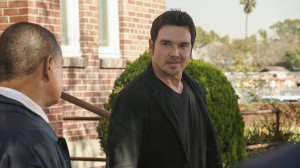 Geddrick’s Hickman, as well as the gang-related case at the center of these episodes also serves as a tool for the writers to touch on the very relevant and very real issue of race and racial tension between civilians and police, but Duff maintains that his purpose as a storyteller is not to present these issues with bias, but merely present them as they are and allow his audience to judge them for themselves. “I’m ruthless about not politicizing issues or current events, that is not what I am trying to do with this show. What I am trying to do is be authentic and as unbiased as possible. I present issues that reflect our current events as they are and the facts clearly indicate that there are racial tensions between minority groups and the law enforcement community. I am not making that up, I am merely acknowledging it.”
Geddrick’s Hickman, as well as the gang-related case at the center of these episodes also serves as a tool for the writers to touch on the very relevant and very real issue of race and racial tension between civilians and police, but Duff maintains that his purpose as a storyteller is not to present these issues with bias, but merely present them as they are and allow his audience to judge them for themselves. “I’m ruthless about not politicizing issues or current events, that is not what I am trying to do with this show. What I am trying to do is be authentic and as unbiased as possible. I present issues that reflect our current events as they are and the facts clearly indicate that there are racial tensions between minority groups and the law enforcement community. I am not making that up, I am merely acknowledging it.”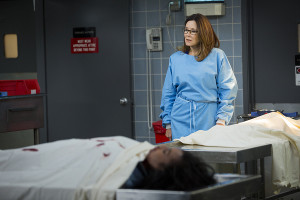 Looking forward, Duff reveals that the writers are already hard at work crafting season five, which will premiere this summer. After the intensity of these final episodes of this season, it seems natural, and welcome, for Duff to have a more harmonious theme to open season five: balance. “We will be exploring how we balance our professional and personal lives, how we balance needs of adults and needs of children, how we balance our virtual world with the real world, and how we balance our fantasies of how things are going to be with the actualities.” In addition to finding balance in the lives of his characters, Duff jokes that he is also on a personal journey to finding balance with his cast and crew. “Balancing a cast this large is phenomenally difficult, and it makes me really, really appreciate Game of Thrones and Downton Abbey and those are even larger cast shows. It’s a very interesting process!”
Looking forward, Duff reveals that the writers are already hard at work crafting season five, which will premiere this summer. After the intensity of these final episodes of this season, it seems natural, and welcome, for Duff to have a more harmonious theme to open season five: balance. “We will be exploring how we balance our professional and personal lives, how we balance needs of adults and needs of children, how we balance our virtual world with the real world, and how we balance our fantasies of how things are going to be with the actualities.” In addition to finding balance in the lives of his characters, Duff jokes that he is also on a personal journey to finding balance with his cast and crew. “Balancing a cast this large is phenomenally difficult, and it makes me really, really appreciate Game of Thrones and Downton Abbey and those are even larger cast shows. It’s a very interesting process!”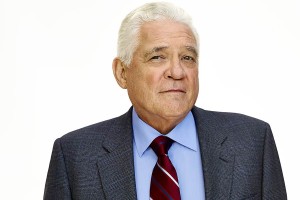 Though his perpetual troublemaker days may never truly been behind him, evidence suggests that Lt. Provenza may at last be mellowing a bit. MajorCrimesTV.net spoke with G.W. Bailey during a recent set visit to get the scoop on the upcoming winter episodes of Major Crimes, and find out if Provenza may finally be a changed man (hint: there may be wedding bells in his near future!)
Though his perpetual troublemaker days may never truly been behind him, evidence suggests that Lt. Provenza may at last be mellowing a bit. MajorCrimesTV.net spoke with G.W. Bailey during a recent set visit to get the scoop on the upcoming winter episodes of Major Crimes, and find out if Provenza may finally be a changed man (hint: there may be wedding bells in his near future!)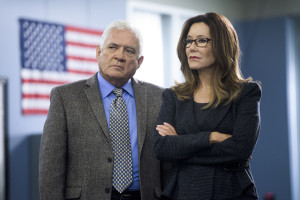 big first for us, so that’s been fun to explore. And the best part is that we (the actors) truly don’t know, or rather we won’t know the outcome until the final episode, so all of us on set have our own theories as to who it might be.
big first for us, so that’s been fun to explore. And the best part is that we (the actors) truly don’t know, or rather we won’t know the outcome until the final episode, so all of us on set have our own theories as to who it might be.